CUEB Convenes Conference on Preparation Work for 2024 Audit and Evaluation of Undergraduate Education and Teaching
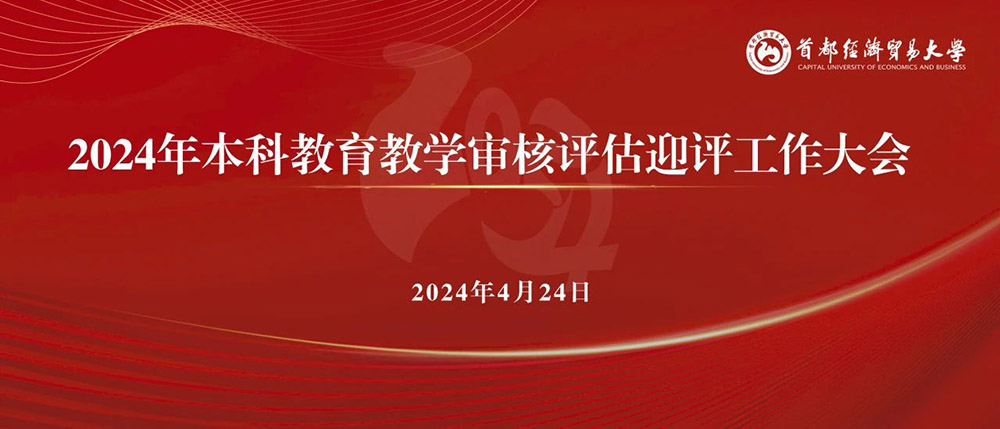
On the afternoon of April 24, CUEB convened the Conference on Preparation Work for 2024 Audit and Evaluation of Undergraduate Education and Teaching at the Zhuoyu Lecture Hall. Many notable CUEB leaders attended the conference, namely, Wang Wenju, Party Secretary of CUEB; President Wu Weixing, Deputy Party Secretary; Xu Fang and Meng Bo, Deputy Party Secretary; Mao Baizhan, Member of Standing Committee of the Party Committee and Secretary of Discipline Inspection Commission; Yin Zhichao, Chen Yanbin, Yao Linxiu and Li Kunpeng, members of the Standing Committee of the Party Committee and Vice Presidents; Zhao Guang, member of the Standing Committee of the Party Committee and Director of Party Committee Organization Department and United Front Work Division, and Guo Hai, the Assistant Principal. CUEB Vice President Li Xiaomu chaired the meeting.
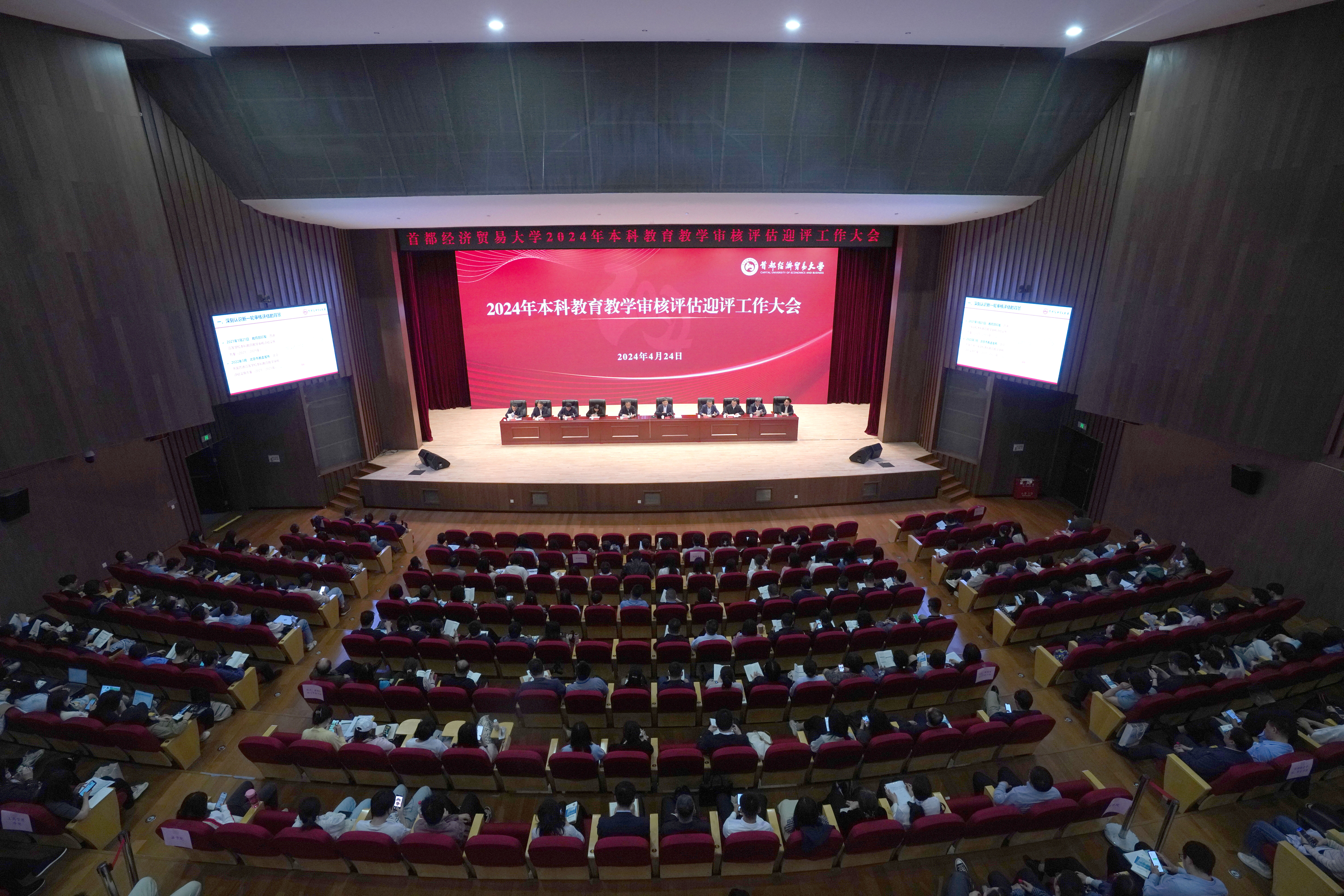
Wang Wenju emphasized the pivotal role of the ongoing audit and evaluation of undergraduate education and teaching at CUEB. It’s critical for all functional departments and schools to adopt a problem-oriented approach, ensuring that the audit and evaluation work are carried out in a systematic and high-quality manner.
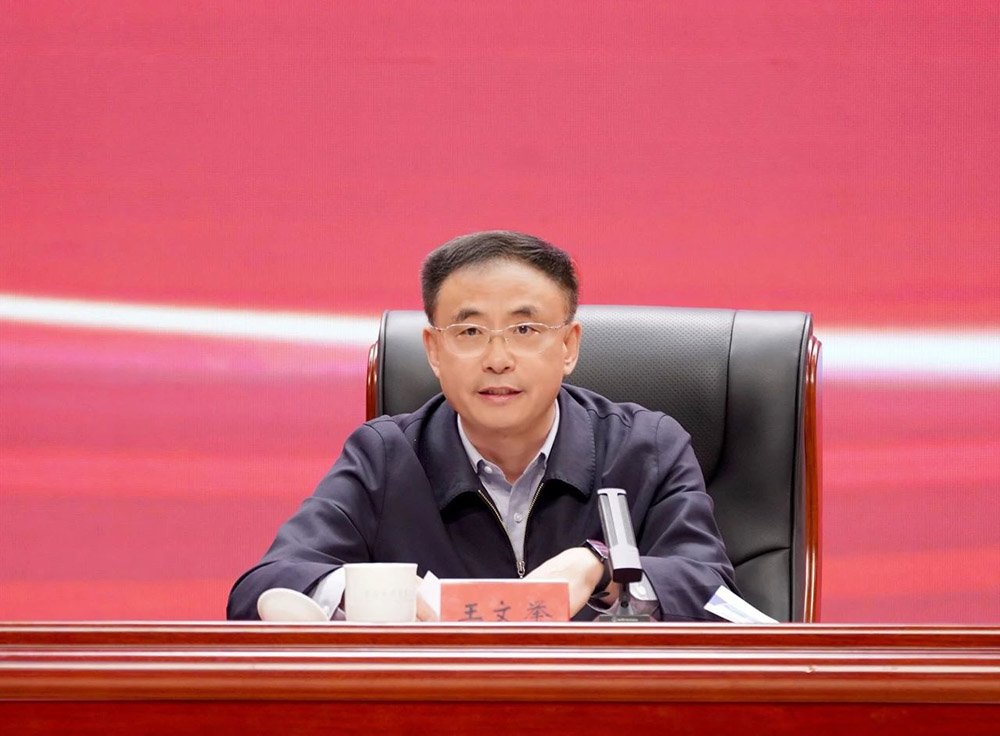
Wang proposed three requirements:
• Firstly, approach the audit and evaluation from a broader perspective, and fully recognize its significance. All members of CUEB, including staff and students, should enhance the awareness of quality and challenges at hand. We must conduct a comprehensive review of our educational experience, identify issues for improvement in personnel cultivation, and align ourselves with the mission of cultivating competent individuals for the Party and the country. By embracing these challenges and preparing for the evaluation of personnel cultivation in the new era, and do a good job in evaluation work to promote CUEB development.
• Secondly, comprehend the essence of the audit and evaluation deeply. We should adhere to the principles of “Five Upholds” and prioritize the principles of “One Fundamental, Two Prominences, Three Strengthenings, and Five Degrees” in our work. This entails achieving the personnel cultivation goals, adapting to societal needs, ensuring the availability of faculty and adequate resources, maintaining the quality, and meeting the expectations of both students and employers.
• Thirdly, implement the evaluation work vigorously. We need to deeply understand and reflect on our work, examining not only current problems and constraints but also seizing the opportunity to refine CUEB’s educational characteristics, innovate approaches, strengthen management, and enhance quality. This entails a comprehensive reconstruction of undergraduate instruction, to accelerate high-quality development. We should fulfill our duties, analyze the limitations in current undergraduate teaching, and envision new objectives, directions, and models for personnel cultivation, especially in the realms of digitalization and intelligence. These insights should be transformed into solid and effective reform measures. Ultimately, by cultivating the personnel through the outcomes of this evaluation, we can promote undergraduate teaching to new heights, thereby driving the high-quality development of CUEB.
Wu Weixing outlined the necessary work for the evaluation as follows:
• Firstly, understand the background and characteristics of the evaluation;
• Secondly, ensure thorough preparations for the preliminary stages of the evaluation;
• Thirdly, understand the key aspects and highlights of the evaluation;• Fourthly, involve all staff in the whole evaluation work.
Wu mentioned that the most crucial aspect of education is to foster virtues. The audit and evaluation of undergraduate education and teaching concerns all CUEB members, so everyone should understand their role in undergraduate education.
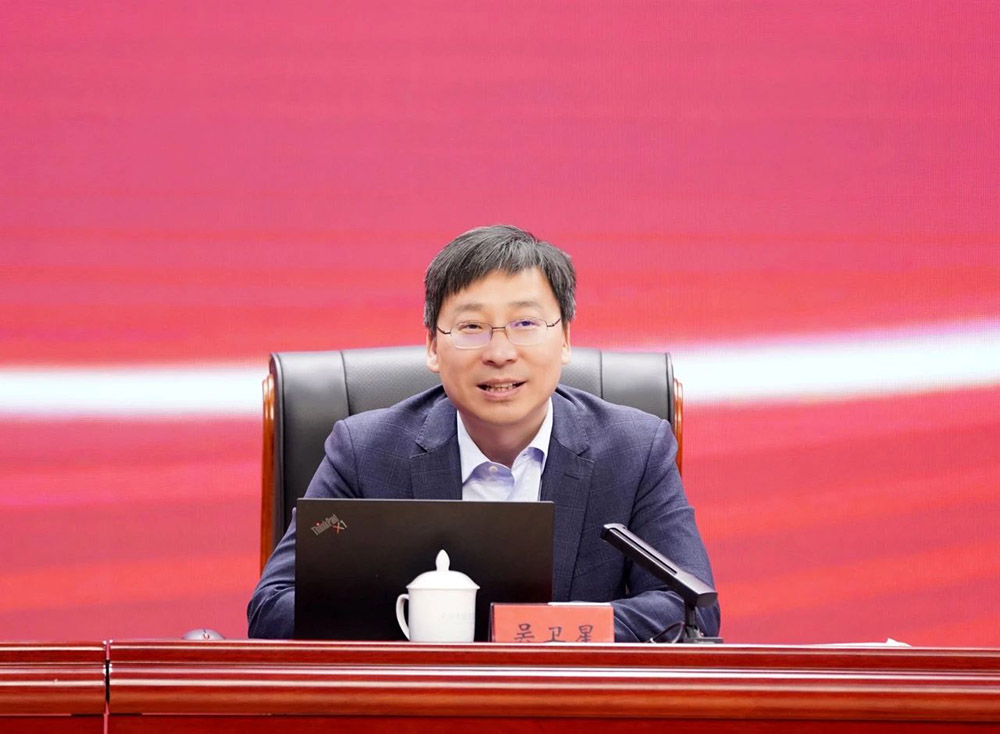
Wu emphasized the following highlights:
• Adhere to the principle of fostering virtue and construct the system of “Three-Wide Education”;
• Pursue distinctive characteristics and social recognition in a discipline setting;
• Establish a cultivation system for top-notch innovative personnel;
• Focus on the digital intelligence transformation of undergraduate programs in the context of new liberal arts;
• Optimize the layout of personnel cultivation under the new liberal arts paradigm to serve the capital;
• Advance the integration between industry and education as well as between technology and education;
• Strengthen the professional ethics and expertise of teachers through the Office of Teacher Advancement;
• Establish a quality monitoring and evaluation system through institutional construction.
In response to the upcoming evaluation, Wu put forward two requirements:
• Firstly, strengthen responsibility and commitment with collaborative efforts. CUEB has established a “one office, nine groups” mechanism. Each group must fully understand the importance of the evaluation, meticulously implement the school’s unified directives, and work together to succeed in all aspects of the work.
• Secondly, consider the overall situation to ensure effective implementation. We should rigorously execute a system that departments heads take full responsibility to enhance coordination and cooperation. All the schools and departments must address challenges collectively to improve personnel cultivation quality and deepen reform in undergraduate education. We hope to realize the objective of “promoting construction, quality, management, and development through evaluation,” as we strive to establish CUEB as a domestically distinguished and worldly-renowned university of finance and economics.
Vice President Li Xiaomu emphasized the paramount importance of personnel cultivation. Given the fact that undergraduate personnel cultivation is more fundamental, he urged all schools and functional departments to effectively disseminate the spirit of this conference to every faculty member and student. We should work hard to attain all the objectives and tasks outlined in the new round of undergraduate education evaluation, imbuing them with CUEB characteristics.
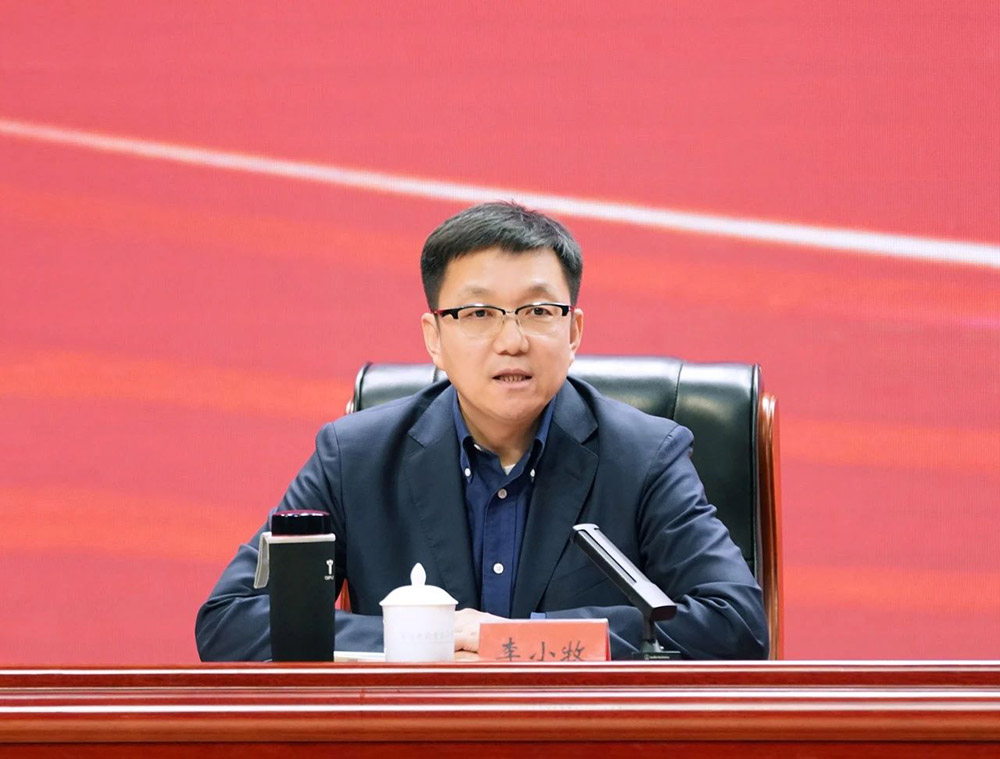
Compared to the previous evaluation spanning from 2013 to 2018, this new round evaluation emphasizes “evaluation-driven construction, quality, management and development”. The objective is to help universities clarify their positioning and orientation to strengthen educational management, improve campus infrastructure and ambiance, and deepen educational reforms for high-quality development. The process includes evaluation application, self-assessment, expert appraisal, feedback, prescribed rectifications within stipulated timelines, and follow-up rectification. After the Ministry of Education released the evaluation plan in April 2021, CUEB promptly initiated a new round of evaluation. Preparations were undertaken throughout the school, including extensive discussions and refinement sessions. In June 2023, the CUEB Undergraduate Education and Teaching Evaluation Work Plan was issued. Training and publicity for evaluation were widely conducted, featuring more than 10 special lecture training sessions and a release of 12 interpretation documents, including the Learning Handbook.
To facilitate the creation of important documents such as the Self-Evaluation Report and Characteristics Report, a dedicated class for drafting these reports was established. A special inspection of undergraduate teaching was conducted under the theme of “promoting construction through evaluation,” involving all undergraduate teaching units. In December 2023, three experts were invited for a pre-evaluation visit to the school. In April 2024, the CUEB Undergraduate Education Teaching Evaluation Promotion Plan was issued, and the “one office, nine groups” mechanism for evaluation work was established. Online expert evaluations were planned for May 2024, followed by on-site expert visits in June.
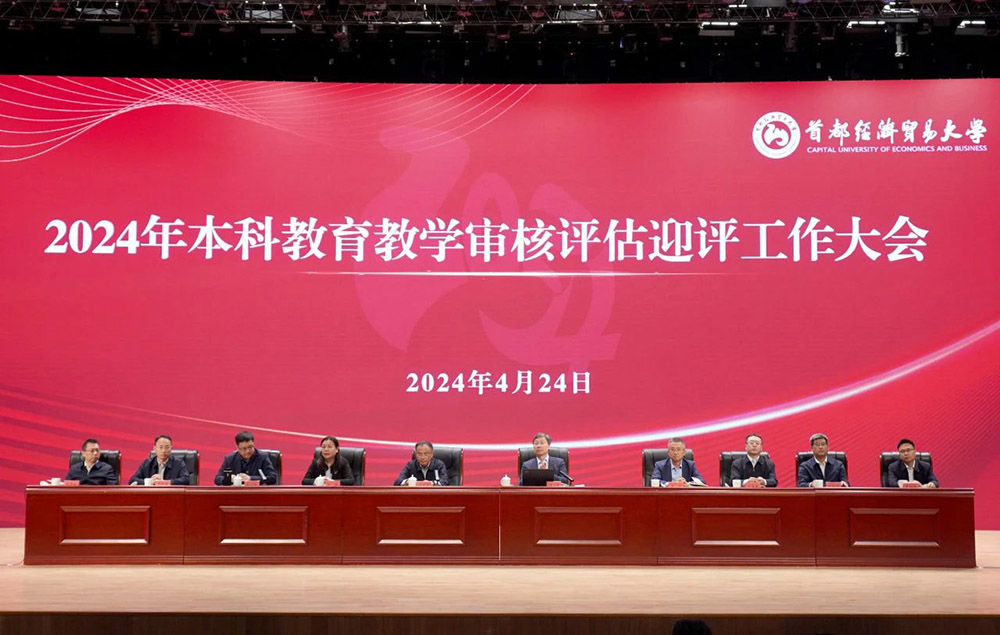
Over 700 participants attended this conference, including cadres at the level of deputy director and above, school-level teaching supervisors, directors of various teaching units, leaders of teaching research groups (course group leaders), teaching secretaries, as well as representatives of teachers and students.
